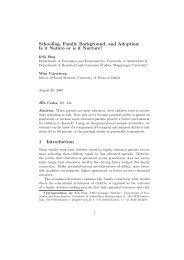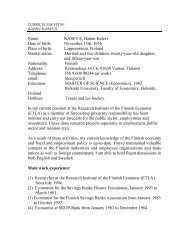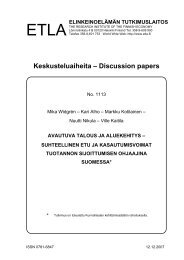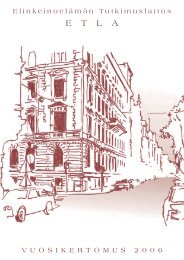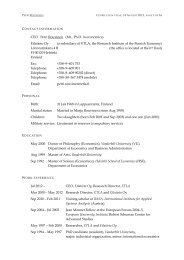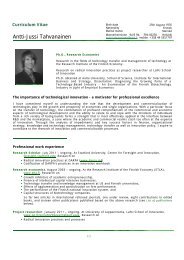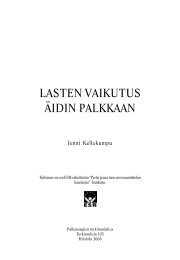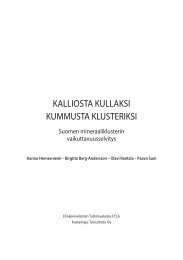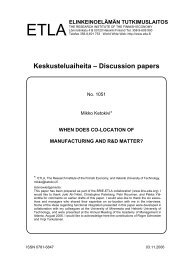Sergey Boltramovich, Grigory Dudarev, and Vladimir Gorelov ... - Etla
Sergey Boltramovich, Grigory Dudarev, and Vladimir Gorelov ... - Etla
Sergey Boltramovich, Grigory Dudarev, and Vladimir Gorelov ... - Etla
Create successful ePaper yourself
Turn your PDF publications into a flip-book with our unique Google optimized e-Paper software.
already for the number of years. The dem<strong>and</strong> for steel in 2001 exceeded<br />
already 20 mln tons. Consumption of the steel <strong>and</strong>, especially of the nonferrous<br />
metals per capita is very low in Russia (10–30 % below the western<br />
level). It is expected to grow as the domestic processing industries<br />
gain strength <strong>and</strong> the purchasing power of the population increases.<br />
Domestic dem<strong>and</strong> for the products of the cluster fell dramatically with<br />
the introduction of liberal economic reforms, <strong>and</strong> in order to survive the<br />
companies of the industry had to export most part of their output. However,<br />
only Russian products with low added value are competitive in the<br />
world market, which led to substantial deterioration of product structure<br />
of the cluster. Besides, Russian products are gradually forced out from<br />
the markets of developed countries, <strong>and</strong> this trend will possibly continue<br />
in the short to medium term. Another important trend of shifting labor<br />
<strong>and</strong> energy intensive manufacturing away from developed countries associated<br />
with growth of domestic dem<strong>and</strong> for the higher quality products<br />
will, in medium term, most probably offset <strong>and</strong> reverse effects of this<br />
trend on domestic producers. Today the major markets for the Russian<br />
metals are located in the developing countries. Anticipated future growth<br />
of these markets that could substantially outpace the growth in developed<br />
world will add substantially to the opportunities of the Russian<br />
producers as they acquired a good knowledge <strong>and</strong> positions in many of<br />
the important markets.<br />
Another possible source for improving efficiency <strong>and</strong> gaining advantages<br />
in Russia will be achieving higher rate of collection of scrap <strong>and</strong><br />
domestic processing of the secondary raw materials. So far these are<br />
among the most criminalized areas of activities in Russia. Lack of efficient<br />
infrastructure, rules <strong>and</strong> regulations leads to various damages to<br />
operating equipment as some are trying to dismantle <strong>and</strong> sell even the<br />
most important items. On the other h<strong>and</strong> lack <strong>and</strong> difficulties in operating<br />
the collection <strong>and</strong> processing motivate the unrecorded activity as it is<br />
closely to impossible to efficiently comply to all the numerous <strong>and</strong> contradicting<br />
rules <strong>and</strong> regulations. The domestic manufacturing on the<br />
other h<strong>and</strong> will benefit substantially from the efficient <strong>and</strong> transparent<br />
scrap collection <strong>and</strong> processing.<br />
Development of competitive capabilities of the metallurgy <strong>and</strong> metal<br />
working cluster in Northwest Russia require substantial improvements in<br />
national, regional <strong>and</strong> industry’s investment climate in order to provide<br />
major growth of financial inputs in the cluster. Besides, it is crucial to<br />
have the larger domestic market (mainly machine building <strong>and</strong> construction),<br />
which is perhaps the only way to provide for a better product<br />
structure involving a larger proportion of products with high added<br />
value.



